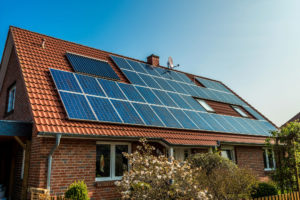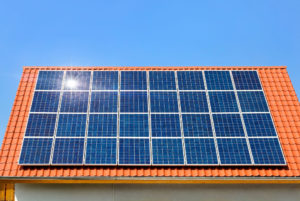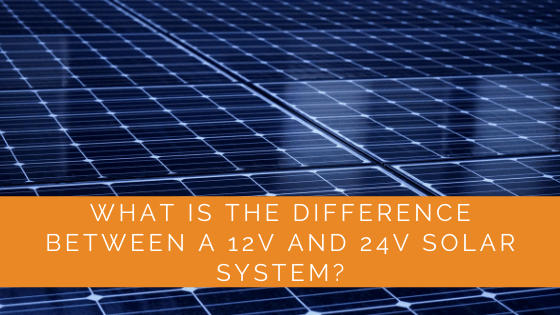Have you decided to go for solar power instead of electricity? Well, you’ve come to the right place!
It’s common for people to struggle when choosing between the 12 or 24 system voltage. With the advancement in solar power technology, there are many variations, brands, and types of solar panels—each categorized by some level of difference.
As time goes on, solar input systems have become relatively popular. Aside from offering many economic benefits, solar installation benefits households in terms of low maintenance, cheap, renewable, and many others. If you’re new to solar systems, this guide will help you decide if the 12v system is better for you or the 24-volt system.
Contents
Key Takeaways:
- A 12V solar system is suitable for low-voltage equipment like camping lights and emergency radios, making it cost-efficient, low-maintenance, and lightweight.
- A 24V solar system, with more solar cells and higher voltage, is better for applications requiring more energy, such as factories and large buildings, although it is relatively costly.
- The choice between 12V and 24V depends on your specific needs and budget, with both systems contributing to energy efficiency and sustainability.
12V System
All solar panels differ in their battery system, energy, watts, power needs, etc. Some appliances require high voltage, while some require low voltage. The 12v battery solar panel is used for low-voltage equipment such as camping lights, emergency radios, etc.
While they may not be ideal for every solution, the 12V solar panels can still be used for many situations. Let’s look at a few of the 12-volt solar panel features.
Features of 12V Batteries
Number of Solar Cells
In the standard 12v battery, there are 36 solar cells. They have a series connection that produces the right voltage to charge a 12V battery bank.
The Voltage of Battery for 12V Solar Panels
12-volt solar panels are usually compatible with 12V batteries. However, it also depends upon the rating of the battery.
Inverter Compatibility for 12V Solar Panel
Like the voltage requirement, the 12V solar panel should be compatible with the rating of the inverters. Therefore, this solar panel should have a 12V inverter.
Charge controller for 12V Solar Panels
 Similarly, if you’re using 12V batteries and a 12V inverter, the charge controllers should also be 12V for the best output voltage. A vital tip to remember is that the charge controller’s rating should not be higher than the solar panel voltage. For example, if your solar panel is ten amps, it won’t be compatible with a four amps charge controller.
Similarly, if you’re using 12V batteries and a 12V inverter, the charge controllers should also be 12V for the best output voltage. A vital tip to remember is that the charge controller’s rating should not be higher than the solar panel voltage. For example, if your solar panel is ten amps, it won’t be compatible with a four amps charge controller.
Appliances
12V solar systems can be used for machines that don’t require as many volts. Find out how much power your appliances require. The volt of your appliance should be the same amount as the solar panel voltage. If they need less than 1000 watts of energy, you’re better off opting for a 12v solar panel.
Some of these appliances include:
- Phone charger
- Street lamps
- Camp lighting equipment, such as flashlights
- Air conditioners
- Heating systems
- Maintenance of car battery
- Fishing boats
Price Ranges
Depending on whether your solar panel has a lithium battery or monocrystalline and other factors, the prices for 12V solar panels can vary. They can start for as low as £12 and go as high as £200+. Most of these don’t include the price for charge controllers and inverters. You’d need to buy those separately.
Pros of a 12V Solar Panel
12V solar systems can be beneficial if they match your energy needs. Here are a few of their pros:
Cost-Efficient
Paying your electricity bills every month can get very expensive. Even though the 12V panels can be a bit pricey, it saves money in the long run. When you compare their cost with your bills, it’s typically lower.
Little to no Maintenance
The maintenance of these types of panels is minimal. Damages rarely occur to this solar panel. In case they do get damaged, there are always repair professionals you can connect with at any given time.
Lightweight
The 12V solar system is very lightweight. It’s easier to carry around than most solar systems. 12V load weight ranges from 1lb to 25 lbs.
Availability
Nowadays, most solar panels are manufactured for 12-volt systems. This means you can connect one battery of 12V in one line. It will allow for direct current into the charge controller.
Cons of 12V Solar Panels
Although there are very few disadvantages to this solar panel, let’s take a look at some of them:
Size of Wire
12V solar system requires a wire with a relatively large diameter. This is typically used to transfer power between a battery bank and the inverter. The larger the wire is, the more extra cost it’ll include. Thinner cables don’t use as much copper as large ones.
Loss of Voltage
When the voltage of a solar system is low, you’ll need to keep the components close together. This is done to avoid any chance of voltage loss or the requirement of a larger wire to save money.
24V System
You’ll probably see a resemblance if you compare the physical appearance of a 12v and 24v solar system. Although both look the same, a 24V solar system includes more solar cells.
Let’s dive right into its features!
Features of a 24V Battery
Number of Solar Cells
 A 24V solar installation system consists of double the solar cells of 12V solar systems. In simple calculation, this would end up with the solar panel having 72 solar cells.
A 24V solar installation system consists of double the solar cells of 12V solar systems. In simple calculation, this would end up with the solar panel having 72 solar cells.
The Voltage of Battery for a 24V Solar Panel
Since this feature depends on the solar panel’s rating, a 24V grid solar system should be attached with a 24V battery. The problem is that a single battery of 24V isn’t produced in the UK, whether lithium batteries, monocrystalline or other batteries.
To resolve this issue, you would need to attach double 12V batteries. The two batteries are connected in a series format. This solar panel requires a higher voltage system than the 12V system. The voltage and battery for the solar panel should be of the same power.
Inverter Compatibility for a 24V Solar Panel
Inverters are available in ratings of 12V, 24V, 48V, etc. For a 24V solar system, you need a 24V rating inverter for the best result. They will also be connected in series.
Solar Charge Controllers for a 24V Solar Panel
It’s important to note that the solar panel’s rating needs to be lower than the charge controller. For the 24V solar system, the charge controller should also be 24V since both the inverter and voltage are also 24V.
Appliances
The 24V solar panel has a higher voltage battery bank than the 12V one, and therefore, it can be used for grid applications and other appliances with higher energy needs. A few appliances that can be used with this system are listed:
- Factories
- Solar parks
- Large buildings such as hospitals, companies, etc.
- Sufficient to run all home appliances on this system
Price Ranges
If you’re looking for only the panels, they can vary starting from 200 pounds. But if you’re looking for a whole solar system, the price can go up to 4,000 pounds. Even though it’s a bit costly, it’s a pretty good investment in the long run.
Pros of a 24V Solar Panel
High Volts
This type of solar panel produces relatively high voltage using the sun. This is enough to power numerous high-power equipment.
Minimal Heat Loss
Since the 24 solar system is compatible with all its components, it has little heat loss. Unlike the 12V solar panel, which needed its components to be nearby at all times, this 24V system doesn’t need that.
Charge More Batteries
The 24V solar panel can charge a 12V battery bank and a 24V battery. This solar system is capable of charging pretty much anything.
Cons of a 24V Solar Panel
There are next to no cons for the 24V solar system:
Costly
As compared to the 12V solar panel, this one is relatively pricey. Even though it has unlimited benefits, not everyone can afford this solar system.
FAQS
Can I connect a 24V solar panel to a 12V battery?
You can attach a 24V solar panel to a 12-volt battery. This is because the 24V panel consists of two 12-volt batteries. It can quickly charge any 12-volt battery.
Is 24V or 12V better?
24V system is better for most cases, but it depends on your needs. Since not all individuals can afford the 24V because of its high price, you’ll find it better to opt for 12V. However, not all machines and devices can run on 12V. Check the power required by your machine before picking either 12V or 24V.
Discover the Power of Solar with Solar Panels Network
Are you navigating the world of solar installations? Look no further than Solar Panels Network, the UK’s trusted partner in harnessing the sun’s potential. Our dedication goes beyond just installations; we’re on a mission to transform how homeowners and businesses across the UK perceive and utilise energy. By choosing us, you’re reducing your carbon footprint and making a smart financial move that promises savings for years ahead. Contact us today and embark on your solar journey.
Final Thoughts
Ultimately, choosing between 24V and 12V comes down to your needs. If you only need a cheap option, go for the 12V. If you require more volts and load, go for the 24V. Both are portable and charge devices. They’re beneficial in their fields, with 24V having a slight advantage over 12V.
The critical thing to remember is that every little step is helpful for the Earth, whether you use 12V or 24V. Solar panel systems are an investment unquestionably worth the money!
About the Author
Solar Panels Network stands at the forefront of solar energy solutions, driven by a team of seasoned solar engineers and energy consultants. With over decades of experience in delivering high-quality solar installations and maintenance, we are committed to promoting sustainable energy through customer-centric, tailored solutions. Our articles reflect this commitment, crafted collaboratively by experts to provide accurate, up-to-date insights into solar technology, ensuring our readers are well-informed and empowered in their solar energy decisions.

